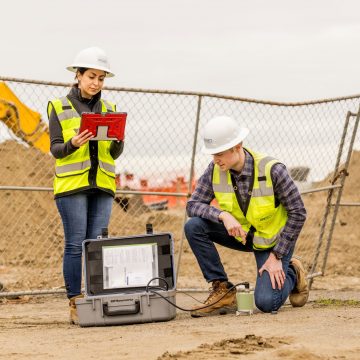Why Employing a Geo Tech Engineer is Important for Complicated Construction Tasks
Why Employing a Geo Tech Engineer is Important for Complicated Construction Tasks
Blog Article
Recognizing the Essential Duty of the Geotechnical Market in Modern Construction Projects and Infrastructure Advancement
The geotechnical market is a cornerstone of contemporary construction and infrastructure advancement, supplying critical insights right into dirt behavior that straight influence project end results. Through sophisticated dirt analyses and innovative engineering services, geotechnical experts not only ensure architectural stability but also address sustainability worries amidst advancing ecological criteria. As infrastructure needs grow and brand-new difficulties emerge, the relevance of this field becomes increasingly evident. What implications might these growths have for future tasks and the total safety and security of our developed setting?
Importance of Soil Analysis
Dirt assessment plays a critical function in the geotechnical market, acting as the structure for educated decision-making in construction jobs. Accurate soil examination is necessary for identifying the viability of a website for different sorts of structures, including residential homes, business structures, and bridges. By examining dirt composition, dampness, thickness, and stamina content, engineers can anticipate potential challenges and mitigate risks connected with ground instability, erosion, and settlement.
The assessment process normally includes a collection of examinations and monitorings that give important info regarding the subsurface conditions. This information informs the style and building processes, making certain that frameworks are improved strong ground with ample support. Comprehending the dirt account enables designers to pick ideal building and construction methods and materials, optimizing source usage and minimizing costs.
Along with ensuring structural honesty, dirt evaluation contributes to ecological sustainability. By determining possible contamination or unfavorable results on surrounding environments, engineers can carry out techniques to secure these natural deposits. Generally, thorough soil analysis is indispensable in the geotechnical area, underpinning the security, performance, and ecological duty of building projects.
Key Geotechnical Strategies
A variety of essential geotechnical techniques are employed to assess and improve the security and performance of building and construction sites. One foundational method is soil tasting and screening, which permits engineers to figure out the chemical and physical properties of the ground. This details is essential for making informed choices regarding foundation style and construction techniques.
An additional important technique is site characterization, which includes the thorough evaluation of dirt and rock conditions through techniques such as borehole exploration and in-situ testing. Techniques like Criterion Penetration Tests (SPT) and Cone Infiltration Examinations (CPT) supply valuable information on soil strength and stratigraphy.
Ground improvement techniques, such as soil stablizing and grouting, are likewise important in boosting the load-bearing capacity of weak dirts. These approaches can mitigate negotiation and improve total website problems.
Additionally, incline security evaluation is vital for determining potential landslide threats and ensuring the safety of excavations. This evaluation usually uses mathematical modeling and limit stability methods to anticipate soil habits under different problems.
Incorporating these geotechnical techniques right into building and construction planning not just enhances task results yet also ensures the long-term sustainability of framework growth.
Effect on Building And Construction Security

In addition, efficient geotechnical engineering involves applying mitigation approaches for determined dangers. This might consist of dirt stabilization methods, maintaining frameworks, or drain systems to ease hydrostatic stress. By dealing with these aspects, building and construction teams can reduce the possibility of accidents and improve worker security.
In addition, continuous monitoring of site conditions is important throughout building. Geotechnical instruments can supply real-time information concerning ground motion and stability, permitting prompt interventions when required.
Essentially, the geotechnical sector plays a crucial find out here role in protecting construction jobs. By prioritizing ground stability and using extensive evaluation techniques, the geotechnical field not only secures the workforce but additionally adds to the longevity and reliability of built infrastructure.
Sustainability in Geotechnical Practices

Additionally, geotechnical engineers are currently utilizing sophisticated innovations, such as geosynthetics, which improve soil stability while lowering the volume of product needed. This not just saves sources however likewise brings about much less waste generation (geotechnical engineers). The integration of lasting layout principles right into geotechnical engineering urges making use of renewable resource resources in building procedures, even more reducing carbon exhausts
In addition, extensive site assessments are essential for recognizing possible ecological impacts prior to building begins. By performing these assessments, geotechnical professionals can establish approaches that minimize adverse impacts, guaranteeing conformity with ecological laws. In general, the focus on sustainability within geotechnical techniques not just adds to the long life and durability of facilities however also why not try here promotes a responsible method to land and resource monitoring. This dedication is essential for cultivating sustainable development in the modern construction landscape.
Future Trends in Geotechnical Design
Innovation is driving the future of geotechnical engineering, as emerging methods and modern technologies reshape the market. The integration of sophisticated information analytics and synthetic intelligence is readied to change site examination and threat analysis, allowing engineers to make more informed decisions based on real-time data. Additionally, making use of geosynthetic materials is gaining traction, providing lasting services that enhance dirt stability and decrease ecological effect.
An additional considerable trend is the fostering of automated and robotic systems for tracking and building procedures. These modern technologies not just enhance accuracy however additionally enhance safety and security by minimizing human participation in unsafe environments. Furthermore, the application of Building Information Modeling (BIM) in geotechnical design assists in improved cooperation among stakeholders, maximizing job distribution and decreasing expenses.
As climate modification poses new challenges, the sector is progressively concentrating on durability and versatility in style methods, ensuring infrastructure can hold up against severe weather condition events. Ultimately, the ongoing fad towards sustainability will drive technology in environment-friendly materials and approaches, lining up geotechnical design with more comprehensive ecological goals. Collectively, these fads will certainly shape a more effective, sustainable, and durable geotechnical landscape for future jobs.
Conclusion

The geotechnical market is a foundation of contemporary construction and facilities advancement, giving vital insights into dirt actions that directly influence job end results. geotechnical engineers.Dirt evaluation plays a critical duty in the geotechnical industry, offering as the foundation for informed decision-making in construction projects. In general, comprehensive soil assessment is indispensable in the geotechnical field, underpinning the security, efficiency, and ecological responsibility of building projects
Building security is considerably affected by geotechnical methods, as the stability and honesty of the ground directly affect the general safety and security of a building and construction website.In final thought, the geotechnical sector is indispensable in contemporary building and construction and infrastructure advancement, providing crucial evaluations that ensure structural stability and safety and security.
Report this page